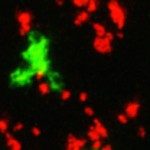Link to Pubmed [PMID] – 21235535
Clin. Exp. Immunol. 2011 Mar;163(3):381-91
Vaccination with autologous cancer cells aims to enhance adaptive immune responses to tumour-associated antigens. The incorporation of Fms-like tyrosine kinase 3-ligand (FLT3L) treatment to the vaccination scheme has been shown previously to increase the immunogenicity of cancer vaccines, thereby enhancing their therapeutic potential. While evidence has been provided that FLT3L confers its effect through the increase of absolute dendritic cell (DC) numbers, it is currently unknown which DC populations are responsive to FLT3L and which effect FLT3L treatment has on DC functions. Here we show that the beneficial effects of FLT3L treatment resulted predominantly from a marked increase of two specific DC populations, the CD8 DCs and the recently identified merocytic DC (mcDC). These two DC populations (cross)-present cell-associated antigens to T cells in a natural killer (NK)-independent fashion. FLT3L treatment augmented the absolute numbers of these DCs, but did not change their activation status nor their capacity to prime antigen-specific T cells. While both DC populations effectively primed CD8(+) T cell responses to cell-associated antigens, only mcDC were capable to prime CD4(+) T cells to cell-associated antigens. Consequentially, the transfer of tumour vaccine-pulsed mcDC, but not of CD8 DCs, protected mice from subsequent tumour challenge in a vaccination model and resulted in eradication of established tumours in a therapeutic approach. These results show that the beneficial effect of FLT3L is associated with the induction of mcDC and suggests that selective targeting to mcDC or instilling mcDC ‘characteristics’ into conventional DC populations could significantly enhance the efficacy of tumour vaccines.

